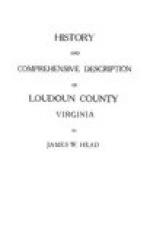[Footnote 18: This stock was the first to introduce and foster slavery in the County.—Goodhart’s History of the Loudoun Rangers.]
John Esten Cooke’s faithful and eloquent delineation of Virginia character is peculiarly applicable to this Cavalier element of Loudoun society. Some conception of that author’s grandiose style and intimate knowledge of his subject may be gained from the following passage:
“The Virginian of the present time has ingrained in his character the cordial instincts and spirit of courtesy and hospitality which marked his ancestors. He has the English preference for the life of the country to the life of the city; is more at home among green fields and rural scenes than in streets; loves horses and dogs, breeds of cattle, the sport of fox-hunting, wood-fires, Christmas festivities, the society of old neighbors, political discussions, traditions of this or that local celebrity, and to entertain everybody to the extent of, and even beyond, his limited means. Many of these proclivities have been laughed at, and the people have been criticised as provincial and narrow-minded; but after all it is good to love one’s native soil, and to cherish the home traditions which give character to a race. Of the Virginians it may be said that they have objected in all times to being rubbed down to a uniformity with all the rest of the world, and that they have generally retained the traits which characterized their ancestors.”
The northwestern part of the County, known as the “German Settlement,” a section of about 125 square miles, extending from Catoctin Mountain westward to the Short Hill Mountains and from the Potomac River southward to near Wheatland, was originally settled by a sturdy and vigorous race of Germans,[19] principally from Pennsylvania, but a few from New York, in which two colonies they had settled on their arrival, only a few years before, from the Palatine states of Germany. They came to Loudoun between the years 1730 and 1735,[20] about the time of the Cavalier settlements.
These German settlers were a patient, God-fearing people, naturally rugged, and very tenacious in the preservation of their language, religion, customs and habits. Every stage in their development has been marked by a peaceable and orderly deportment—a perfect submission to the restraints of civil authority.
[Footnote 19: The first sheep were brought to the County by these settlers.—History of the Loudoun Rangers.]
[Footnote 20: 1732 was most likely the year in which the earliest of these German settlers arrived in Loudoun.]
The earliest of these German arrivals, with native foresight and a proper appreciation of the dangers incident to border settlement in that day of bloody Indian atrocities, came to Loudoun in an organized body, embracing sixty or more families.
Many of the males were artisans of no mean ability, and plied their respective trades as conscientiously and assiduously as others, in the rude manner of the times, tilled their newly-acquired acres.




